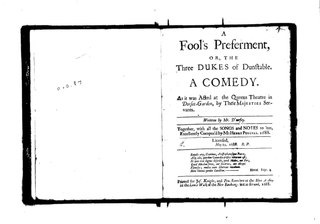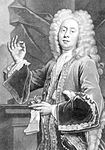Elizabeth Boutell, was a British actress.
The Younger Brother, or, The Amorous Jilt is a comedy written by Aphra Behn. The play was first performed and published posthumously in 1696, but was probably written in the late 1680s.
The Biter is a 1704 play by the English writer Nicholas Rowe. Rowe was better known for his tragedies but chose to try his hand at comedy. Performed at the Lincoln's Inn Fields Theatre, it was not a great success and lasted for about six performances. It was overshadowed by the more popular The Careless Husband by Colley Cibber, which appeared at the Drury Lane Theatre. It was Rowe's only play in a contemporary setting, and he rapidly turned back to historical tragedies beginning with Ulysses (1705). Some sources reported Rowe defiantly and loudly laughing at the jokes during a performance, even while nobody else did.
The Treacherous Brothers is a 1690 tragedy by the English writer George Powell.
The Richmond Heiress is a 1693 comedy play by the English writer Thomas D'Urfey.

The Married Beau or The Curious Impertinent is a 1694 comedy play by the English writer John Crowne. It is inspired by a passage from Miguel de Cervantes's Don Quixote. Incidental music was composed by Henry Purcell.
The Fatal Marriage; Or, The Innocent Adultery is a 1694 tragicomedy by the Anglo-Irish writer Thomas Southerne. It was part of the tradition of She-tragedy which flourished at the time. Incidental music for the work was composed by Henry Purcell.
The Maid's Last Prayer: Or, Any Rather Than Fail is a 1693 comedy play by the Irish writer Thomas Southerne. It was first staged at the Theatre Royal, Drury Lane by the United Company.
The English Frier; Or, The Town Sparks, sometimes spelt as The English Friar, is a 1690 comedy play by the English writer John Crowne. It was originally staged by the United Company most likely at the Theatre Royal, Drury Lane, although it may have appeared at the Dorset Garden Theatre, the other venue of the company. Written in context of the recent Glorious Revolution, it attacks Catholic priests who meddle in English politics, undermining the constitution.

Bury Fair is a 1689 comedy play by the English writer Thomas Shadwell. It is part of the tradition of Restoration Comedy that flourished during the era. It was first staged by the United Company at the Theatre Royal, Drury Lane in London.

Mithridates, King of Pontus is a 1678 tragedy by the English writer Nathaniel Lee. It was first performed at the Theatre Royal, Drury Lane in London by the King's Company. John Dryden wrote the play's epilogue.
Trick For Trick; Or, The Debauch'd Hypocrite is a 1678 comedy play by the English writer Thomas D'Urfey. It was first staged at the Theatre Royal, Drury Lane by the King's Company.
The Spanish Rogue is a 1673 comedy play by the English writer Thomas Duffet. It was first performed at the Theatre Royal, Drury Lane by the King's Company.

Love In The Dark; Or, The Man of Bus'ness is a 1675 comedy play by the English writer Francis Fane. It was first staged by the King's Company at the Theatre Royal, Drury Lane in London. The epilogue was written by the Earl of Rochester, and may also have contributed some of the more libertine lines to the play. It is set in Venice.

A Fool's Preferment; Or, The Three Dukes Of Dunstable is a 1688 comedy play by the English writer Thomas D'Urfey. It is a reworking of John Fletcher's Jacobean work The Noble Gentleman. It was first performed by the United Company at the Dorset Garden Theatre in London. Henry Purcell composed the play's incidental music. It was his first major work composing for the theatre in seven years since Sir Barnaby Whigg.

Love in a Wood; Or, St James's Park is a 1671 comedy play by the English writer William Wycherley. His debut play, it was first staged at the Theatre Royal, Drury Lane by the King's Company.

The Tragedy of Nero, Emperour of Rome is a 1674 tragedy by the English writer Nathaniel Lee. It was originally performed at the Theatre Royal, Drury Lane by the King's Company.
Wits Led by the Nose; Or, A Poet's Revenge is a 1677 comedy play by the English writer William Chamberlayne. It was first staged by the King's Company at the Theatre Royal, Drury Lane in London.
Distress'd Innocence; Or, The Princess Of Persia is a 1690 tragedy by the English writer Elkanah Settle. It was first performed by the United Company at the Theatre Royal, Drury Lane in London. Incidental music was composed for the play by Henry Purcell.

The Campaigners; Or, The Pleasant Adventures At Brussels is a 1698 comedy play by the English writer Thomas D'Urfey. It was first staged at the Theatre Royal, Drury Lane by Christopher Rich's Company.









